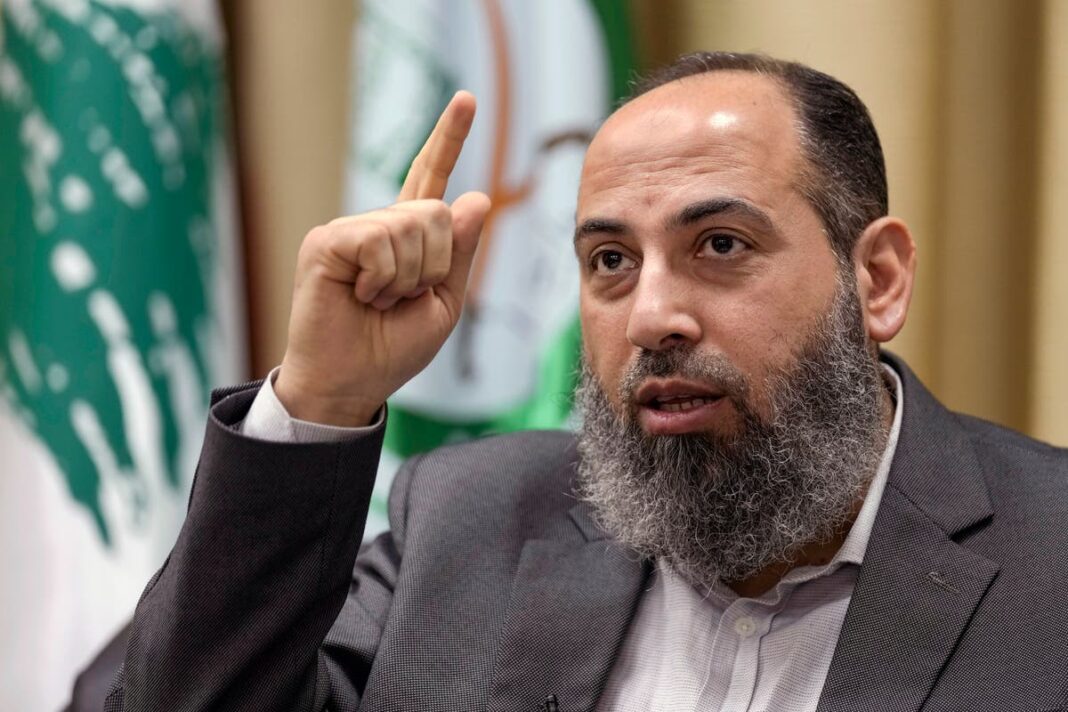The head of a Lebanese Sunni political and militant group that has joined the Shiite militant group Hezbollah in its fight against Israel on Lebanon’s border said Tuesday that the conflict has helped strengthen cooperation between the two groups.
The Secretary-General of al-Jamaa al-Islamiya, or the Islamic Group, Sheikh Mohammed Takkoush said his faction decided to join the fighting along the Lebanon-Israel border because of Israel’s crushing offensive on the Gaza Strip and its strikes against Lebanese towns and villages killing civilians, including journalists, since the Israel-Hamas war started on Oct.7.
“We decided to join (the battle) as a national, religious and moral duty. We did that to defend our land and villages,” Takkoush told The Associated Press at his group’s headquarters in Beirut. “We also did so in support of our brothers in Gaza,” where he said Israel was committing an “open massacre.”
Hamas led a surprise attack in southern Israel on Oct. 7 that killed around 1,200 people and took another 250 hostage. The ensuing Israeli bombardment and ground invasion of the Gaza Strip has killed more than 32,000 Palestinians there, according to local health officials. Since then, violence along the Lebanon-Israel border intensified, displacing tens of thousands of people on both sides
Takkoush said he believed Israel has ambitions to seize more territory “not only in Palestine but in Lebanon too.”
The Islamic Group is one of Lebanon’s main Sunni factions but has kept a low profile politically over the years. It has one member in Lebanon’s 128-seat legislature. Elections within the group in 2022 brought its leadership closer to Hamas.
Like Hamas, it is inspired by the ideology of the Pan-Arab Islamist political movement The Muslim Brotherhood, founded in Egypt in 1928 by a school teacher-turned-Islamic ideologue Hassan al-Banna.
It carries out attacks against Israel mainly from the southern city of Sidon where the group once enjoyed wide influence.
Takkoush said his group makes its own decisions in the field but coordinates closely with Hezbollah, and with the Lebanese branch of the Palestinian militant group Hamas.
“Part of (the attacks against Israeli forces) were in coordination with Hamas, which coordinates with Hezbollah,” he said adding that direct cooperation with Hezbollah “is on the rise and this is being reflected in the field.” He did not elaborate further.
While the Lebanese border area is seen as a Hezbollah stronghold and its population is primarily Shiite, it also has Sunni villages, where the Islamic Group primarily operates.
The tensions between Islam’s two main sects — Sunni and Shiite — originated following the death of Prophet Muhammad in 632. It has reverberated across the wider Middle East till the present day thus making cooperation between Hezbollah and al-Jamaa al-Islamiya all the more rare.
The Islamic Group’s armed wing, known as the Fajr Forces, has claimed responsibility for a series of attacks along the Lebanon-Israel border since the outbreak of the Israel-Hamas war.
They have lost five fighters so far, Takkoush said, with three killed in an Israeli airstrike in a border area earlier this month.
The other two were killed in a Jan. 2, Israeli strike on an apartment in Beirut that targeted top Hamas official Saleh Arouri.
The group’s use of weapons against Israel is not new. It founded its Fajr Forces in 1982 at the height of the Israeli invasion of Lebanon.
Israel withdrew from southern Lebanon in 2000 ending an 18-year occupation. But the Lebanese government says Israel still occupies the disputed Chebaa Farms and Kfar Chouba hills that Israel captured from Syria during the 1967 Mideast war.
In the current conflict, “coordinating and cooperating with a movement like Hamas, the most honorable liberation movement, is an honor,” Takkoush said.
Regarding his group’s relations with Hezbollah, Takkoush said it had gone through ups and downs. They had differences regarding the conflicts in Syria and Yemen but put them aside “to resist the Israeli occupation of parts of our Lebanese territories,” he said.
“Our relations with Hezbollah are good and growing and it is being strengthened as we go through war,” Takkoush said.
Takkoush added that all the weapons they use, from bullets to rockets, are from their own arsenal. “We did not get even a bullet from any side,” he said.
As Hezbollah has solidified its position as the most powerful political and military entity in Lebanon, the country’s Sunni community has floundered in the absence of a strong leader.
Asked whether the Islamic Group is trying to fill the gap in Lebanon’s Sunni political leadership left behind by former Prime Minister Saad Hariri who quit politics two years ago, Takkoush said that Prime Minister Saad Hariri still has a base of support and popularity, but his group was not in the habit of filling anyone’s absence.
“We introduce ourselves as partners in building generations and (state) institutions but we do not replace anyone,” he said.





